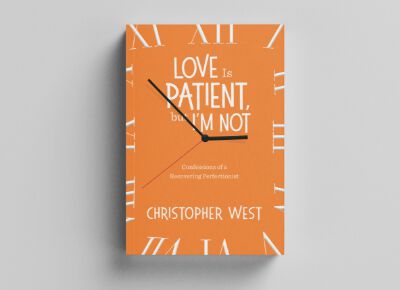How Free Are You Really?
The Sunday's Gospel reading is just a handful of lines at the end of the Last Supper. Jesus has just foretold the betrayal of Judas and he turns to his disciples and he talks to them about identity. He talks to them about Christian identity. He talks to them about how they will be known. He talks to them about his dream for them. And that is that they love one another. He presents it as a new commandment, as a new vision for their lives. We will read in the scriptures where there's no vision that people will perish. And in many, many people's lives today, there is no vision. There's no dream, there's no vision. And we see all around our culture, people perishing as a result of that.
And so Jesus presents this vision. He says, "Life will come from this. You will not perish because you'll have this vision. Love one another. And it's by this that all men will know that you're my disciples." So this is Christian identity right here. There are so many things that we think are essential to our Christian identity. And very often we deprioritize Jesus's vision. He said, "This is the thing." He says, "Love one another. As I have loved you. By this, all men will know that you are my disciples. By this, you will have identity as Christians." Love, it's never something so central to the human experience being so massively misunderstood. Our desire for it tends to be a desire to receive more of it. And yet our ability to receive it depends on our capacity to give it and to experience it.
When we focus on receiving love, our capacity for love tends to shrink. It's when we focus on giving love, when we focus on loving others, that our capacity love increases, and as our capacity to love increases, our capacity and ability to be loved increase. And so in a world that's hungry for love and a world that wants more love, we have to ask ourselves, "Okay, how do we go about that? What is the source of love? How do we increase our capacity to love? How do we increase our ability to love? How do we increase the love and our lives? Both the giving and the receiving." Love is a direct function of freedom. That's why so often Jesus is talking about slavery and freedom. That's why so often Jesus is talking about, he came to set us free because the one thing that will impede love more than anything else is slavery. If we think about the concept of freewill, what makes the concept of freewill so important is that it makes love possible. Without free will love is not possible. Okay. If you say to somebody, "You must love me." And that person says, "Oh, yes, I love you." Well, that person doesn't love you because you've instructed them. You've commanded them to love you. And so free will is essential to love. That's one of the reasons God gave us freewill because he wanted to be in a relationship of love with us. He did not want to be in a relationship of master and servant. He wanted to be in a relationship of love. And so the thing that impedes love more than anything else is slavery. And we all, we have a thousand slaveries that we fall into. We have a thousand slaveries that we entertain. Some of them, little, some of them not so little, but every single one of them impedes that capacity to love, because you can only love to the extent that you are free.
You can only love to the extent that you are free, which is why, when we see someone falling in love with someone who has no self-control, we get concerned. Why? Because we know that person's capacity to love is very, very little because self-control is proof of what? It's proof of freedom. It's proof of possession of self, which is essential to love because love is self-donation in the Christian context. The great philosophers said love is to, will the good of the other. Okay. So we can love everybody, yes, because we can will the good of another person. Even if we don't want to spend time with the person, if we don't particularly like the person, we can still desire good things with that person. But Jesus redefined love in a Christian context right here in today's Gospel. He said, "I give you a new commandment that you love one another, as I have loved you." How did he love us? He laid down his life for us. He committed the ultimate act of self-donation. And so he redefined love as an act of self-donation as an act of, I give myself to you. And in order to give myself to you, I must first possess myself. And that's why freedom is so critical to the Christian ethos and so critical to our lives.
So what are your slaveries? What are the things that stop you from being free? Because they are the things that stop you from loving more. And they are the things that inhibit your capacity for love and anything that inhibits your capacity for love, diminishes, your ability to receive love, to be loved. And that's why God wants us free above all else. He wants us free and he will do everything he can to help us be free.


